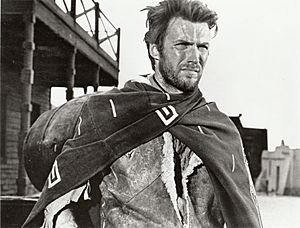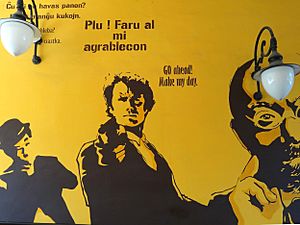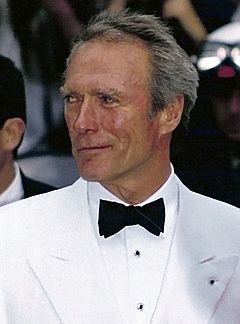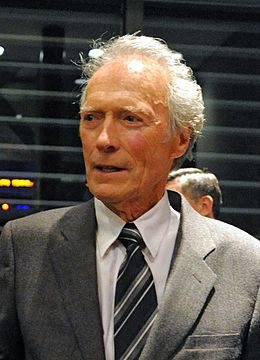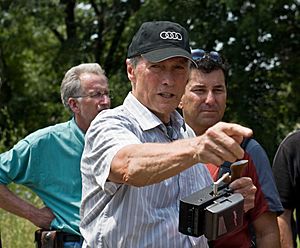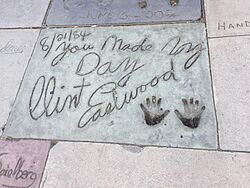Clint Eastwood facts for kids
Quick facts for kids
Clint Eastwood
|
|
|---|---|
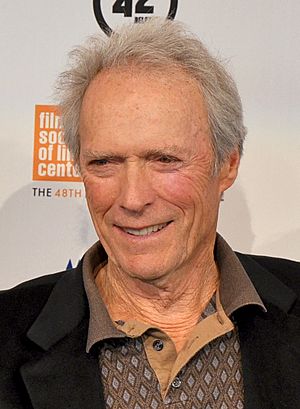
Eastwood in 2010
|
|
| Born |
Clinton Eastwood Jr.
May 31, 1930 San Francisco, California, U.S.
|
| Occupation |
|
| Years active | 1954–present |
| Organization | Malpaso Productions |
|
Works
|
|
| Political party | Libertarian (2008–present) |
| Spouse(s) |
|
| Partner(s) |
|
| Children | At least 8, including Kyle, Alison, Scott and Francesca |
| Awards | Full list |
| Musical career | |
| Genres |
|
| Instruments |
|
| Years active | 1963–present |
| Labels | Warner Bros. |
| 30th Mayor of Carmel-by-the-Sea | |
| In office April 8, 1986 – April 12, 1988 |
|
| Preceded by | Charlotte Townsend |
| Succeeded by | Jean Grace |
| Signature | |
 |
|
Clinton Eastwood Jr. (born May 31, 1930) is an American actor and film director. He first became well-known in the Western TV series Rawhide. He became a world-famous movie star in the 1960s for playing the "Man with No Name" in a series of Italian Westerns called the Dollars Trilogy.
In the 1970s and 1980s, he became famous for playing Harry Callahan, a tough police officer in the Dirty Harry movies. These roles helped make him a lasting cultural icon. For two years, from 1986 to 1988, Eastwood was the mayor of Carmel-by-the-Sea, California.
Eastwood has won four Academy Awards. He won Best Director and Best Picture for his Western film Unforgiven (1992) and his sports drama Million Dollar Baby (2004). He has also directed many successful films that he did not star in, like Mystic River (2003) and American Sniper (2014).
Contents
Early Life
Clint Eastwood was born on May 31, 1930, in San Francisco, California. His parents were Ruth and Clinton Eastwood Sr. He has a younger sister named Jeanne. His family moved several times when he was young because his father had different jobs. They eventually settled in Piedmont, California, a wealthy town.
Eastwood had a tough time in school and had to attend summer school. He was asked to leave Piedmont High School for causing trouble. He later transferred to Oakland Technical High School and graduated in 1949. Before becoming an actor, he worked many different jobs, including as a lifeguard, paper carrier, and forest firefighter.
In 1951, during the Korean War, Eastwood was drafted into the United States Army. He was stationed at Fort Ord in California. While in the army, he was a passenger in a military plane that ran out of fuel and crashed into the ocean. He and the pilot had to swim two miles to shore using a life raft.
Career
1954–1962: Starting Out in Hollywood
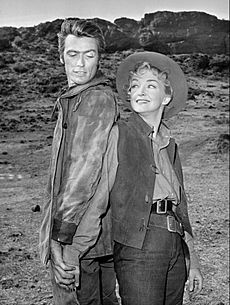
After leaving the army, Eastwood went to Hollywood to become an actor. An assistant at Universal Studios noticed him and arranged an audition. At first, directors thought his acting was not very good. They told him to take acting classes. In 1954, he got a contract for $100 a week.
He had small, often uncredited, roles in movies like Revenge of the Creature (1955) and Tarantula (1955). He also appeared in several TV shows. For a few years, he struggled to find good roles and make enough money.
His big break came in 1958 when he was cast as Rowdy Yates in the TV western Rawhide. The show was a huge success and made him a familiar face to American audiences. It ran for seven seasons, from 1959 to 1965. The work was hard, often involving 12-hour days, six days a week.
1963–1969: Becoming a Movie Star
While working on Rawhide, Eastwood was offered a role in an Italian Western movie called A Fistful of Dollars (1964). It was directed by Sergio Leone, who was not well-known at the time. Eastwood took the role to play a different kind of character than the hero he played on TV. He played a mysterious, tough antihero known as the "Man with No Name."
The movie was a huge hit in Europe and started a new genre called "Spaghetti Westerns." Eastwood starred in two more films in the series: For a Few Dollars More (1965) and The Good, the Bad and the Ugly (1966). When the Dollars trilogy was released in the United States in 1967, it made Eastwood a major international movie star.
After his success in Europe, Eastwood returned to the U.S. and starred in the Western Hang 'Em High (1968). He also started his own production company, Malpaso Productions, which would produce most of his future films. He then starred in the war movie Where Eagles Dare (1968) and the musical Paint Your Wagon (1969).
1970–1989: The Dirty Harry Era
In 1971, Eastwood's career took another big turn. He directed his first movie, Play Misty for Me, in which he also starred. The film was a success and showed that he was a talented director as well as an actor.
That same year, he starred in Dirty Harry, playing a tough San Francisco police inspector named Harry Callahan. The character became one of his most famous roles. The movie was a huge box office hit and led to four sequels over the next 17 years.
During the 1970s and 1980s, Eastwood directed and starred in many successful films. He directed the Westerns High Plains Drifter (1973) and The Outlaw Josey Wales (1976). He also starred in action films like Thunderbolt and Lightfoot (1974) and the prison movie Escape from Alcatraz (1979).
He also showed his comedic side in Every Which Way but Loose (1978) and its sequel Any Which Way You Can (1980). In these films, he played a trucker who travels with his orangutan, Clyde. These comedies were some of the biggest box office hits of his career.
1990–2009: Winning Awards as a Director
In 1992, Eastwood directed and starred in the Western Unforgiven. The film was a huge success with critics and audiences. It won four Academy Awards, including Best Picture and Best Director for Eastwood. This film established him as one of Hollywood's most respected directors.
Throughout the 1990s, he continued to direct and act in popular films. He starred in the thriller In the Line of Fire (1993) and the romantic drama The Bridges of Madison County (1995) with Meryl Streep.
In the 2000s, Eastwood focused more on directing. He directed the drama Mystic River (2003), which earned two Academy Awards for its actors. In 2004, he directed and starred in Million Dollar Baby. The film won four Academy Awards, including another Best Picture and Best Director for Eastwood. At 74, he became the oldest person to win the Best Director award.
He also directed two films about the Battle of Iwo Jima in World War II: Flags of Our Fathers (2006) and Letters from Iwo Jima (2006). He ended the decade by directing and starring in Gran Torino (2008), which became the highest-grossing film of his career at the time.
2010–Present: Continued Success
In the 2010s, Eastwood continued to direct major films. He directed J. Edgar (2011), a movie about the life of FBI director J. Edgar Hoover. He also returned to acting in Trouble with the Curve (2012).
His 2014 film American Sniper was a massive box office success. It told the story of U.S. Navy SEAL Chris Kyle. He followed it with Sully (2016), starring Tom Hanks as the pilot who safely landed a plane on the Hudson River.
In 2018, he directed and starred in The Mule. He then directed Richard Jewell (2019) and Cry Macho (2021). In 2024, he released his latest film, Juror #2.
Directing Style
As a director, Clint Eastwood is known for working very efficiently. He likes to finish scenes in just one take if possible. This helps him finish his movies on time and under budget. He rarely makes his actors rehearse much before filming.
His directing style is often described as classic and straightforward. He focuses on telling a good story without adding too many flashy effects. He often explores themes like justice, mercy, and what it means to be a hero.
Personal Life
Eastwood has been interested in politics for a long time. In 1986, he was elected mayor of Carmel-by-the-Sea, California, and served for two years. He has also been appointed to the California State Park and Recreation Commission.
He is a big fan of jazz music and is a talented pianist. He has composed the music for many of his own films, including Mystic River and Million Dollar Baby. He even has his own record label, Malpaso Records.
Eastwood has been a health and fitness enthusiast his whole life. He is also an avid golfer and a licensed pilot who often flies his own helicopter. He has been practicing Transcendental Meditation for many years. Eastwood has eight children.
Awards and Honors
Clint Eastwood has received many awards for his work in film.
- Four Academy Awards
- Four Golden Globe Awards
- AFI Life Achievement Award in 1996
- Légion d'honneur from France in 2007, the country's highest civilian honor
- Order of the Rising Sun from Japan in 2009
In 1984, his handprints and footprints were added to the cement at Grauman's Chinese Theatre in Hollywood.
| Year | Title | Academy Awards | BAFTA Awards | Golden Globe Awards | |||
|---|---|---|---|---|---|---|---|
| Nominations | Wins | Nominations | Wins | Nominations | Wins | ||
| 1971 | Play Misty for Me | 1 | |||||
| 1973 | Breezy | 3 | |||||
| 1976 | The Outlaw Josey Wales | 1 | |||||
| 1986 | Heartbreak Ridge | 1 | |||||
| 1988 | Bird | 1 | 1 | 2 | 3 | 1 | |
| 1992 | Unforgiven | 9 | 4 | 6 | 1 | 4 | 2 |
| 1995 | The Bridges of Madison County | 1 | 2 | ||||
| 2000 | Space Cowboys | 1 | |||||
| 2003 | Mystic River | 6 | 2 | 4 | 5 | 2 | |
| 2004 | Million Dollar Baby | 7 | 4 | 5 | 2 | ||
| 2006 | Flags of Our Fathers | 2 | 1 | ||||
| Letters from Iwo Jima | 4 | 1 | 1 | 1 | |||
| 2008 | Changeling | 3 | 8 | 2 | |||
| Gran Torino | 1 | ||||||
| 2009 | Invictus | 2 | 3 | ||||
| 2010 | Hereafter | 1 | |||||
| 2011 | J. Edgar | 1 | |||||
| 2014 | American Sniper | 6 | 1 | 2 | |||
| 2016 | Sully | 1 | |||||
| 2019 | Richard Jewell | 1 | 1 | ||||
| Total | 41 | 13 | 22 | 1 | 33 | 8 | |
See also
 In Spanish: Clint Eastwood para niños
In Spanish: Clint Eastwood para niños
 | Jessica Watkins |
 | Robert Henry Lawrence Jr. |
 | Mae Jemison |
 | Sian Proctor |
 | Guion Bluford |


